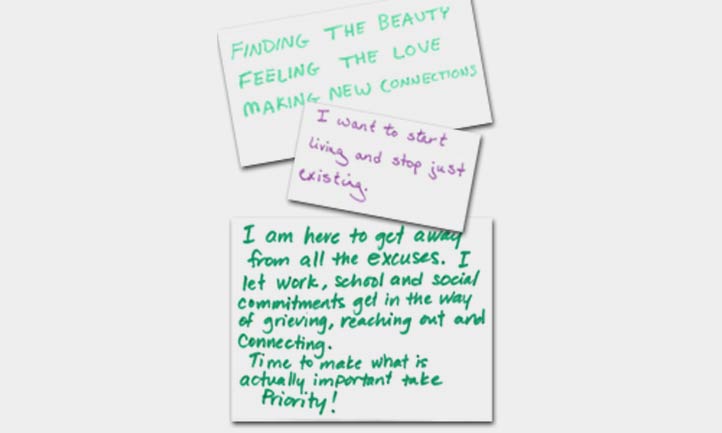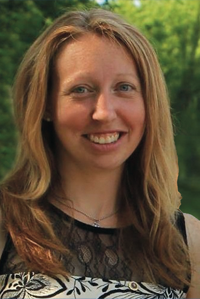Intention Setting
Author: Kelly Griffith
Making Goals That Honor You and Your Hero
The knock at the door came, and my world stopped. But within weeks I realized the world was still spinning for others. And they couldn't understand why mine wasn't. They wanted to know when my world would be in order again. They didn't realize that everything-including my priorities-had changed. I found myself feeling as if all the life goals I had before my brother died weren't worth much anymore. And I didn't know how to replace them. How could I ever plan for a future without him here to motivate me in the tough moments and help me celebrate my victories? We were supposed to grow old together. How could I grow at all now?

By now you have likely discovered that it takes time to reorient yourself, to figure out how to move forward on your grief journey. It takes time to find the new you, but one thing you can consider as you reinvent yourself is that you have the freedom to make goals that honor both your loved one and yourself.
Here are some tips to help you in your intention setting →
Start Small
At first, it may be a major goal just to get out of bed or brush your teeth. And that's okay. Once you start setting small goals and accomplishing them, you can begin to build momentum so that you can tackle tougher goals. Although it was difficult in the early days, I found that making sure I stayed healthy was a really important way to honor my brother's memory. After about a week without eating much of anything, I decided to focus on my eating habits. Somehow it seemed easier to eat when my family went to Sam's favorite restaurant and shared stories.
Ruth Wiley, surviving mother of Lieutenant Colonel Jim Wiley, said of her first small goals, "In the beginning, our first priority was to go to the cemetery every day, making sure the flowers were fresh, and the flags were flying. We still care that the cemetery is well kept, but now we keep a bouquet of flowers at our table. It reminds us of the wonderful times we shared as a family while Jim was here. Sitting down to family dinner is so important, not to share the food, but to share the love."
Help Others
Our loved ones had a profound impact on our lives. How better to honor them and ourselves than to try to have a positive influence on others? Julie Webb, surviving mom of Lance Corporal Jeffrey Webb, started volunteering her time with the USO of North Carolina's family support team, helping other families of the fallen when they travel in the days and weeks after their loved one's death. It allows her to honor Jeffrey and find fulfillment for her own heart.
Some families choose to set up scholarship funds in honor of their service member. Lisa Freeman started the Captain Matthew C. Freeman Memorial Sibling Scholarship to help siblings of service members killed in the line of duty. Lisa wanted to honor the life of her son and acknowledge the struggles and emotional pain of his sisters.
Leslie Blei Shapiro, surviving mother of Eugene Bonacci, III, has made it a mission to get others to sign up as organ and tissue donors in hopes they will save lives, as her son did with the gifts of his organs after his death. She said, "Out of our horrible tragedy came a ray of hope and some positive impact on more than forty-eight people whose lives were either enhanced or saved that evening of his death. More people were helped from skin and bone transplants in the months after his death."
Get Moving
You may find running to be an outlet for your grief and a way to honor your hero. I had started running before Sam died, but shortly after his death, I restarted a plan with run/walk intervals and built up to a 5K. After I was able to run that far, I kept going. I started working on my speed as well. The first Thanksgiving after Sam's death brought my best 5K time to date, and I felt my brother cheering me on the whole time. As much as my brother didn't like to run, I know he really supported me in my efforts. Now I'm slowly building up to run a half marathon for Team TAPS.
Many of us find that running for Team TAPS is healing in both the physical activity and the ability to raise awareness and money for TAPS. Kyle Balduf, surviving twin brother of Sergeant Kevin Balduf, ran the Marine Corps Marathon last October after many months of training. Running was one of Kevin's favorite things to do, but he never got the chance to run a marathon, so Kyle ran it for him.
Use Available Benefits
Often survivors have mixed feelings about using benefits. We may feel hesitant because it seems we are taking advantage of a tragic situation or profiting from our loss. However, our loved ones wanted to ensure that we would be taken care of. They made us their beneficiaries to provide for us through the death gratuity, SGLI, DIC, and SBP. In addition, the death opened doors to help many survivors better themselves through education.
Surviving spouses, children, and siblings can take advantage of scholarships that fund higher education. It's a wonderful avenue for working toward a dream and honoring your service member. Ashlynne Haycock, surviving daughter of Sergeant First Class Jeffrey Haycock and retired Senior Airman Nichole Haycock, wanted to honor both her parents and herself by completing college. Now, as the TAPS Education Support Services Coordinator, Ashlynne helps other survivors find education benefits and scholarships to help them finance their college careers.
Continue to Grow
As you create and accomplish goals for yourself, you will oftentimes find it is bittersweet. But there can be beauty in it. My younger brother David used the impact Sam made on his life as a catalyst for his Eagle Scout project. He designed, raised funds for, and led the construction of a War on Terror memorial in our hometown, honoring all of the heroes from Wake County, North Carolina, who died while serving our country since September 11, 2001. David raised all the necessary funds, executed the project, and dedicated it with hundreds of community members.
Although our brother isn't here to see us grow, David and I take comfort in knowing he is with us in our hearts and realizing how proud he would be that we are part of his living legacy. One of my favorite memories of my brother was a time he stopped at my parents' house and I was the only one home. I made him dinner and I thought to myself, "I can't wait until I have a place of my own and I can cook like this for Sam." Now that I have moved out on my own, I want to make sure I welcome other friends and family members into my new home. And there will be plenty of cooking.
Find Help from Others
Your TAPS family is here to help you set and achieve your goals. You can reach out for support by calling the 24/7 National Military Survivor Helpline at 800-959-8277. Or you can make connections and learn from other survivors in person at a TAPS running event, seminar, or retreat. New this year, empowerment retreats give members of the TAPS family the opportunity to start planning for their future, whether that means finding the next chapter in life or new love.
The early days of grief can be some of the darkest, but take heart. I have realized it is possible to set and accomplish new goals. It is possible for me to be part of Sam's living legacy. And with each goal achieved, I find a little part of the old Kelly mixed in with the new me-a new me that also honors my brother.
We invite you to share how you are your loved one's living legacy by using #livinglegacy on social media and tagging @TAPS4America.
 By Kelly Griffith, Surviving sister of Maj. Samuel Griffith: Kelly Griffith is the surviving sister of Marine Corps Major Samuel Griffith, who was killed in action in Afghanistan on December 14, 2011. Raised in North Carolina, Kelly now lives in the Washington, D.C., area where she works for TAPS. Her degree in journalism and the profound impact of her older brother's life and service enable Kelly to fulfill her goal of sharing the compassion and care of TAPS with other survivors through her writing.
By Kelly Griffith, Surviving sister of Maj. Samuel Griffith: Kelly Griffith is the surviving sister of Marine Corps Major Samuel Griffith, who was killed in action in Afghanistan on December 14, 2011. Raised in North Carolina, Kelly now lives in the Washington, D.C., area where she works for TAPS. Her degree in journalism and the profound impact of her older brother's life and service enable Kelly to fulfill her goal of sharing the compassion and care of TAPS with other survivors through her writing.